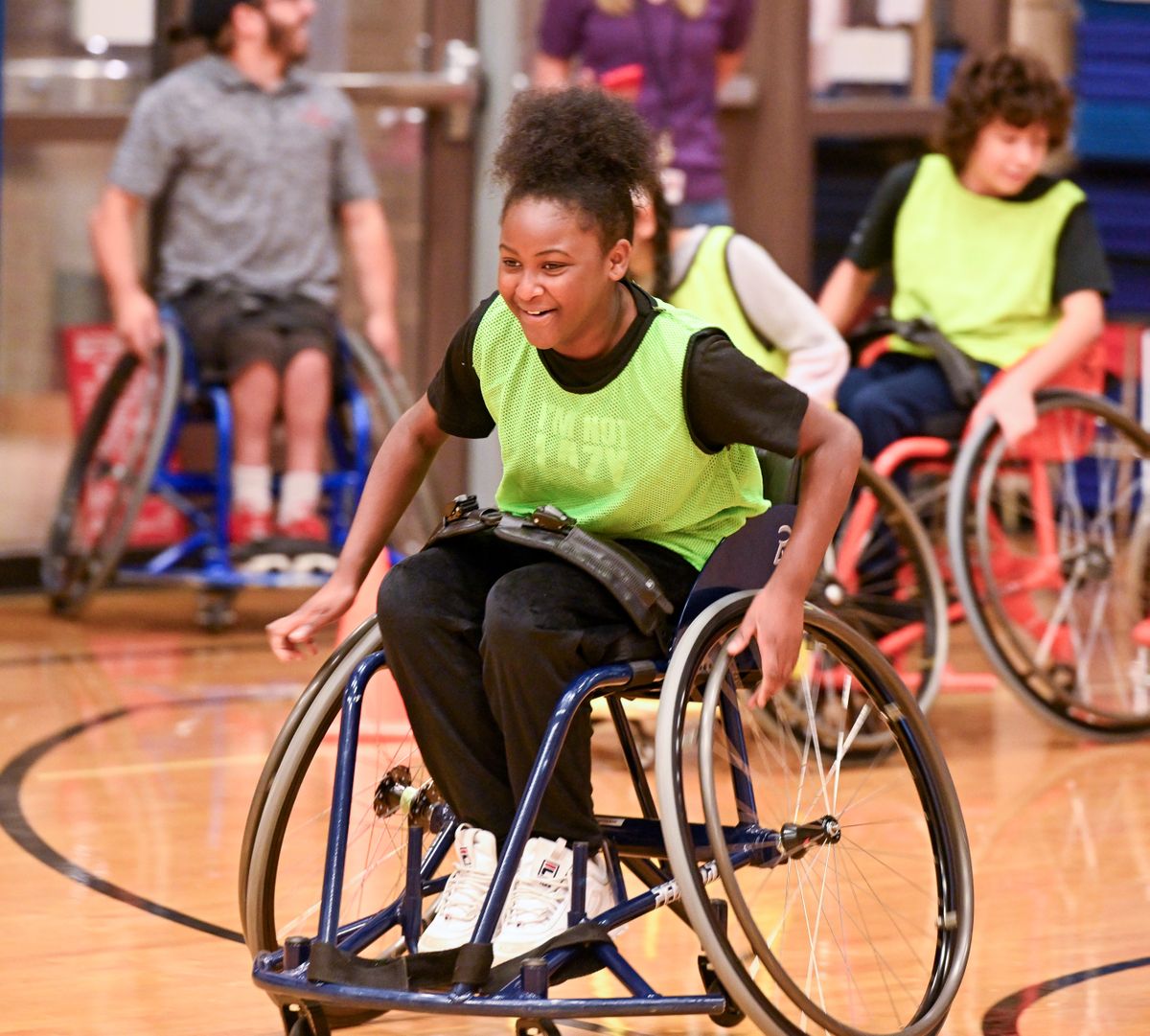Para-athletes take over gym class at Westview Elementary: ‘It helps break down the barriers’

Students at Westview Elementary School learned a valuable lesson about capabilities and inclusion in gym class on Tuesday with the aid of three para-athletes and 30 basketball wheelchairs.
The athletes from ParaSport Spokane, who use sport wheelchairs and other mobility devices to compete in sports like track events and basketball, took over gym class Tuesday at the Northwest Spokane school.
“They get to experience a little bit of what it’s like to potentially have a disability or have access to a sport that you would play if you had some type of disability,” said Teresa Skinner, founder and executive director of ParaSport Spokane “That, I think, opens up their eyes about what’s possible. It helps break down the barriers of their perception of people with disabilities.”
That morning, kids’ shrieks and laughter echoed off the gym walls as they sped around on wheelchairs and occasionally bumped wheels with each other. Skinner explained the anatomy of a basketball wheelchair, with an extra wheel in the back to keep the chair from tipping and angled wheels for stability as athletes zoom around the court.
Kids found the chairs to be comfortable, with a slight learning curve to maneuver.
“It’s like sitting in a car but you can control the wheels instantly,” said fifth-grader Jenner Fend. “I love sitting.”
“I liked how fast you were and how I could always sit down and never have to stand again,” said third-grader Kate Cannel, though all three para-athletes could stand and walk without their wheelchair.
“It was a little hard, but a little easy,” said Serynity Shropshire, as she tried to mimic the speedy hairpin turn of athlete Jessica Bellefeuille.
Not only was it fun for students to try a new sport, it instilled the hands-on lesson that people with physical disabilities are active and competitive in sports.
“This is a good way for able-bodied students to see that this is a real competitive sport, it’s not just for fun,” said Michael Anwar, who competed in the world championships in 2023 in frame running, a track event where athletes use a three-wheeled running frame akin to a bike with no pedals. “It’s fun to put them in our shoes and have a little taste of it, and it’s fun to see them get humbled because it’s difficult.”
For Paralympian Isaiah Rigo, 25, teaching the kids brings back fond memories of learning to play sports when he first joined ParaSport at age 6, long before he competed in three track events at the 2020 Tokyo Paralympic Games.
“As an older athlete, it’s time to help coach or help bring up the younger generation,” Rigo said. “With able-bodied students, it kind of brings back the joy because they’re so new to it; just like any person with a disability that’s new to any sport, they’re so excited or some might be nervous.”
Athletes from ParaSport regularly visit elementary school PE classes around Eastern Washington to show the capabilities of people with disabilities. Westview third -grade teacher Tiffiny Santos coordinated the visit after having para-athlete Bob Hunt visit her classroom. At first, she said her students were shy during this visit, but after he explained the mischief he got into in his wheelchair in third grade, she saw her students relate and open up to Hunt.
“They were asking him the big questions and made a connection with somebody who they didn’t necessarily look like on the outside,” Santos said. “I just thought it was such a beautiful moment. They were so into what he was saying, and they suddenly felt at ease asking him questions.”
So, she invited ParaSports athletes to visit and “take over” PE class for the day, to the delight of hundreds of Wilson pupils.
Rigo hopes the experience gives kids more perspectives from which to view people with disabilities.
“If they see anybody in a wheelchair or anybody with a physical disability, we’re hoping their mindset is like, ‘Oh, I’m not better than them just because I’m walking or whatnot,’ but the mindset is ‘Oh, what sport do you do? I wonder if they ever tried wheelchair basketball,’” Rigo said. “Imagine a real kid asked someone, ‘What sport do you play?’ That small little question can change their perspective, or change a person with a disability’s life.”